What I'm Reading: July 2022, with Commentary
July 14, 2022 at 6:38 PM
Here are the books, with Commentary, I’ve read and most admired in recent months, January 22–June 2022. The Commentary at the end of this post is on book banning.
- Unthinkable: Trauma, Truth, and The Trials of American Democracy by Jamie Raskin, memoir, history
- The Power of Regret: How Looking Backward Moves Us Forward by Daniel Pink, guide to living
- Going There by Katie Couric, memoir
- Atlas of the Heart: Mapping Meaningful Connection and the Language of Human Experience by Brene Brown, advice on living, dealing with our emotions
- You are the Love of My Life by Susan Richards Shreve, fiction
- Lost & Found by Kathryn Schulz, memoir
- Run Towards the Danger: Confrontations with a Body of Memory by Sarah Polley, memoir essays
- Better: A Surgeon’s Notes on Performance by Atul Gawande, medical memoir, stories; rereading
- The 1619 Project: A New Origin Story, created and edited by Nikole Hannah Jones with many contributors, essays, photographs, literary timelines, poems, stories
- The Beauty of Dusk: On Vision Lost and Found by Frank Bruni, memoir
- The Joy of Reading by Donalyn Miller and Teri S. Lesesne, professional
- Literacy is Liberation: Working Toward Justice Through Culturally Relevant Teaching by Kimberly N. Parker, professional
- In the Dreamhouse: A Memoir by Carmen Maria Machado, genre breaking memoir
- One Long River of Song by Brian Doyle, essays, rereading
- Teaching for Racial Equity by Tonya B. Perry, Steven Zemelman, with Katy Smith, professional
- The Gift of Story: Exploring the Affective Side of the Reading Life by John Schu, human impact of stories, professional
- Mink River by Brian Doyle, fiction
- Hell of A Book by Jason Mott, fiction
- Nobody Gets Out Alive: Stories by Leigh Newman, short stories, fiction
- Young Mungo by Douglas Stuart, fiction
- Invisible Child: Poverty, Survival, and Hope in an American City by Andrea Elliott, nonfiction, narrative reporting
- Trauma-Informed Teaching: Cultivating Healing-Centered ELA Classrooms, Vol. 1, NCTE
- The Courage to Teach by Parker Palmer, professional, rereading
- Bewilderment by Richard Powers, fiction
- The Lincoln Highway by Amor Towles, fiction
While I highly recommend all the books on the list, I want to call out the texts that left the strongest impressions--those books that most impacted and informed me as a reader, writer, learner, thinker, and citizen.
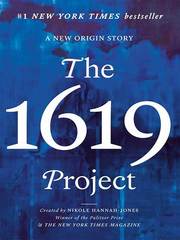 I begin where I left off in my last “What I’m Reading with Commentary” , January 2022. I concluded with The 1619 Project: A New Origin Story—restricting my comments to the beginning of the book, which gave me a sense of urgency to call out the book, even though I’d only just started it. That response to the book’s Preface, first chapter, and Acknowledgments is copied below, in quotations, followed by my response to the whole book.
I begin where I left off in my last “What I’m Reading with Commentary” , January 2022. I concluded with The 1619 Project: A New Origin Story—restricting my comments to the beginning of the book, which gave me a sense of urgency to call out the book, even though I’d only just started it. That response to the book’s Preface, first chapter, and Acknowledgments is copied below, in quotations, followed by my response to the whole book.
It took me a few months to complete The 1619 Project: A New Origin Story. It’s not just that the book is long; the stories of our history of enslaved people are difficult to read, digest, and confront. The many essays by well-known Black voices on topics such as fear, politics, citizenship, punishment, inheritance, progress, and much more are beautifully written and thoroughly researched. Absorbing the history of how and why enslaved people were dehumanized and brutalized is breathtaking in its depth and awfulness. The book is emotionally devastating to read. I could only read it all by taking breaks, reading other books in between, and then returning to The 1619 Project.
That said, this is a crucial book at this time in our history. Acknowledging and reckoning with the legacy of slavery and enslaved people are painful but necessary if we are to create a country where all citizens truly have an equal right to “life, liberty, and the pursuit of happiness” and to live in a country that, finally, rejects white supremacy and racial hierarchy. In essence, this is a landmark, eye opening book on the Black experience in America, not just in the past but in the present, and how race affects every aspect of life. Meticulously researched, with more than 1000 endnotes, the book is scholarly and, at the same time, eminently readable.
I was stunned to learn how little I really knew about enslaved people in America, for example, that slave markets were once prominent in the North as well as the South; that plantation owners could take out mortgages on their enslaved workers to raise money for a new building; that the wealth gap between Black and white households has remained stagnant for generations, which continues to negatively impact and limit opportunities for Blacks as well as other marginalized groups. “The typical Black household today is poorer than 80 percent of white households.” (p. 470) The authors in The 1619 Project champion equal access for all and that Blacks be afforded what many whites take for granted: decent housing, “the sacredness of the ballot” (p. 453), quality integrated education, jobs, food, and safety. Home ownership, for example, largely depends on inherited wealth (p. 471). As a reader, I came away not just with greater historical knowledge but also with more understanding and empathy for the Black experience in America, past and present. Reading the book also confirms how far we have to go as a country to advance beyond the widely held belief that if Blacks move forward, whites lose out. That victimization belief was methodically analyzed and debunked in The Sum of Us: What Racism Costs Everyone and How We Can Prosper Together by Heather McGhee, which is one of the books I called out for excellence and influence in What I’m Reading, June 2021.
We have a long way to go to rectify and make a start on restitution to atone for the horrific wrongs of the past and to finally appreciate and celebrate Black culture and achievements as integral to our nation’s multi-racial character. Thoughtfully reading The 1619 Project has makes me want to do my part to break down white resistance to racial equality. In the final, soul-stirring essay, “Justice” by Nikole Hannah-Jones, she acknowledges Black Americans’ “legacy to this nation”:
"America would not be America without the wealth of Black labor, without Black striving, Black ingenuity, Black resistance. So much of the music, the food, the language, the art, the scientific advances, the athletic renown, the fashion, the guarantees of civil rights, the oratory and intellectual inspiration that we export to the world, that draws the world to us, comes forth from Black Americans, from the people born on the water. That is Black Americans’ legacy to this nation." (p. 475)
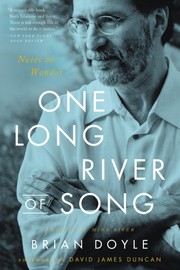 One Long River of Song by Brian Doyle is one of the finest collections of personal essays you’re likely to encounter. I read the book when it was first published in 2019 and reread it recently because I was seeking solace. I was not disappointed; I was uplifted. In her New York Times Book Review, Margaret Renkl says Doyle writes “the loveliest descriptions of the natural world I have ever read.” Doyle pays close attention and gives homage to nature, everyday events, and language with a soulfulness that will make you laugh, tear up, and rejoice. His prose sweeps you away; his essays are spiritual, mystical, and full of wonder. One Long River of Song is essentially an appreciation and celebration of what life can be if we live it with humility, humor, gratitude, love, and kindness.
One Long River of Song by Brian Doyle is one of the finest collections of personal essays you’re likely to encounter. I read the book when it was first published in 2019 and reread it recently because I was seeking solace. I was not disappointed; I was uplifted. In her New York Times Book Review, Margaret Renkl says Doyle writes “the loveliest descriptions of the natural world I have ever read.” Doyle pays close attention and gives homage to nature, everyday events, and language with a soulfulness that will make you laugh, tear up, and rejoice. His prose sweeps you away; his essays are spiritual, mystical, and full of wonder. One Long River of Song is essentially an appreciation and celebration of what life can be if we live it with humility, humor, gratitude, love, and kindness.
His opening dedication and vision for us reads: “To the overlooked and misunderstood, to compassion and grace that conquer all division. To imagination and creativity. May they flow fearlessly and endlessly.” One of my favorite lines in the book is this one: “All you can do is face the world with quiet grace and hope you make a sliver of difference.” (p. 58)
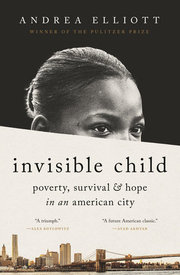 Invisible Child: Poverty, Survival, and Hope in an American City by Andrea Elliott, is a remarkable book written by a first-rate reporter who spent eight years following and being present in the life of Dasani Coates and her family. Joining the author on her journey, we get to go inside Desani’s life, along with her seven siblings and parents, as they continuously move in and out of various housing shelters around the New York City area. Thanks to Elliott’s intimate storytelling, we get to know Desani well—her trials and tribulations, her intelligence and perseverance, and her daily frustrations. She is a victim in an inequitable system who personifies what it’s like growing up poor, Black, and struggling in America. As the author notes, “Poor children tend to live with chronic stress. They have greater exposure to violence, hunger, sleep deprivation, and illness.” (p. 278) The child protection system that is supposed to help children like Desani is cruelly and, often heartlessly, stacked against them and their family (p. 342) and can cause “the rupture of a family” (p. 446). Despite an opportunity for an education in a boarding school out of state, Desani finds herself forced to choose between being at a better school and being with her family, who she loves. Despite all the bleakness, moments of hope and triumph also permeate the narrative. Individuals who step up to help Desani and her family and, mostly, Desani herself--her grit, determination, curiosity, and indominable spirit—show a vibrant portrait of resilience against hard-hitting odds.
Invisible Child: Poverty, Survival, and Hope in an American City by Andrea Elliott, is a remarkable book written by a first-rate reporter who spent eight years following and being present in the life of Dasani Coates and her family. Joining the author on her journey, we get to go inside Desani’s life, along with her seven siblings and parents, as they continuously move in and out of various housing shelters around the New York City area. Thanks to Elliott’s intimate storytelling, we get to know Desani well—her trials and tribulations, her intelligence and perseverance, and her daily frustrations. She is a victim in an inequitable system who personifies what it’s like growing up poor, Black, and struggling in America. As the author notes, “Poor children tend to live with chronic stress. They have greater exposure to violence, hunger, sleep deprivation, and illness.” (p. 278) The child protection system that is supposed to help children like Desani is cruelly and, often heartlessly, stacked against them and their family (p. 342) and can cause “the rupture of a family” (p. 446). Despite an opportunity for an education in a boarding school out of state, Desani finds herself forced to choose between being at a better school and being with her family, who she loves. Despite all the bleakness, moments of hope and triumph also permeate the narrative. Individuals who step up to help Desani and her family and, mostly, Desani herself--her grit, determination, curiosity, and indominable spirit—show a vibrant portrait of resilience against hard-hitting odds.
Andrea Elliott’s Invisible Child won the 2022 General Nonfiction Pulitzer Prize. To see multiple, glowing reviews from The New York Times, The Atlantic, Washington Post, and NPR—just to name a few-- go to https://www.andrea-elliott.com/invisiblechild Like other outstanding books on how structural racism and institutional failure contribute mightily to the housing crisis for our nation’s poor, Invisible Child lays bare in heartbreaking detail how we shamefully fail our country’s most vulnerable children and their families. What I have crucially learned from reading Invisible Child as well as other groundbreaking books on eviction, substandard housing, and lack of housing-- in particular, Evicted: Poverty and Profit in The American City by Matthew Desmond and This Is All I Got: A New Mother’s Search for Home--has convinced me that until we first house the homeless, we will not solve the accompanying crises of mental illness, drug addiction, violence, food and job security, segregated schools, and more. Invisible Child captured me totally, heart and soul. I couldn’t put the book down. This deeply affecting story of a part of America that too often remains unseen still resonates with me.
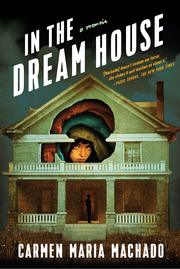 In the Dreamhouse by Carmen Maria Machado is unlike any memoir I’ve ever read. The content, writing, and original format are engaging, astonishing, and captivating in ways I’ve never previously experienced. While this “genre-bending” memoir is about domestic and psychological abuse and the harrowing trauma it unleashes, the writing is so elegant and the form and format so inventive, I couldn’t put the book down. As the author notes, “. . the story is about “a house that was not a house and a dream that was no dream at all.” Because most of the book is written in the second person, the story is driven by you, the reader, who becomes a character in the story. That technique intensifies everything that happens with Machado’s nameless girlfriend, who can be loving at times but is also, unpredictably cruel and violent. That Machado survives this abusive relationship and is able to write about it is testimony to her strength and healing. As abuse stories about same-gender partners are so rarely told, Machado’s courageous narrative breaks that silence and shines a spotlight on a terror that has rarely been made public. Machado literally has to invent her own language and form just to be able to tell her harrowing story. It’s no wonder then that I am unable to do justice to this extraordinary memoir, which defies easy description.
In the Dreamhouse by Carmen Maria Machado is unlike any memoir I’ve ever read. The content, writing, and original format are engaging, astonishing, and captivating in ways I’ve never previously experienced. While this “genre-bending” memoir is about domestic and psychological abuse and the harrowing trauma it unleashes, the writing is so elegant and the form and format so inventive, I couldn’t put the book down. As the author notes, “. . the story is about “a house that was not a house and a dream that was no dream at all.” Because most of the book is written in the second person, the story is driven by you, the reader, who becomes a character in the story. That technique intensifies everything that happens with Machado’s nameless girlfriend, who can be loving at times but is also, unpredictably cruel and violent. That Machado survives this abusive relationship and is able to write about it is testimony to her strength and healing. As abuse stories about same-gender partners are so rarely told, Machado’s courageous narrative breaks that silence and shines a spotlight on a terror that has rarely been made public. Machado literally has to invent her own language and form just to be able to tell her harrowing story. It’s no wonder then that I am unable to do justice to this extraordinary memoir, which defies easy description.
See the following rave reviews for In the Dreamhouse for much more information and insight:
- New Yorker review: https://www.newyorker.com/books/page-turner/carmen-maria-machados-many-haunted-stories-of-a-toxic-relationship
- The Guardian review: https://www.theguardian.com/books/2020/jan/05/in-the-dream-house-carmen-maria-machado-review
- Harvard Review: https://harvardreview.org/book-review/in-the-dream-house/
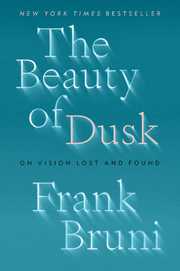 Finally and importantly, The Beauty of Dusk: On Vision Lost and Found by Frank Bruni will lift your spirits in these uncertain times.
Finally and importantly, The Beauty of Dusk: On Vision Lost and Found by Frank Bruni will lift your spirits in these uncertain times.
You might have seen Bruni’s beautiful and haunting essay that preceded his memoir: “One Day I Couldn’t See Right. My Life Hasn’t Been the Same Since." In this Opinion piece, Bruni, former New York Times columnist, describes how he woke up one morning with blurred vision, caused by a rare stroke. Initially devastated, he shares how this hardship and disability changed him to “see” people and life more clearly, to live more fully, and to adapt after a devastating loss.
Read his beautifully written and inspiring Opinion piece, and my hunch is you’ll want to read the book for the full story.
Commentary: Some Thoughts on Book Banning
I hadn’t expected to be writing about book banning in 2022, but we are living through different and difficult times. The unprecedented rise of book banning is a well-coordinated effort to remove “inappropriate” books from many of our school and public libraries. But who decides? Who determines which voices and stories are worthy of being heard, read, and discussed? It often feels like forces outside of our control—school boards, legislators, politicians, the courts-- are making consequential decisions about our lives and our children’s lives that are best left to librarians, parents, teachers, families, students, and ourselves. I am certainly not an expert on this fraught issue but as an avid reader, an advocate for democracy, and a freedom lover I feel the need to make my voice heard. Let’s be frank: book banning is about controlling, limiting, and excluding access to information: ideas, history, facts, and opinions deemed controversial and unacceptable—and most of those protestations are related to race and racism, sexual and gender identity, and L.G.B.T.Q issues.
Also, some parents, legislators, and others complain that the language in books causes harm; therefore, book censorship is necessary. I’ve never seen any research to confirm that “harm". While it’s a rite of passage for many of us--coming across books or language in our childhood we’re not mature enough to handle or read yet--I’d say the language worries are overblown. I remember at about age 12, coming across my mother’s carefully hidden copy of Lady Chatterley’s Lover by D.H. Lawrence. I can still recall the two lines that shocked me. But harmed me, no. After sneak reading a few parts of the book, I put it back in its hiding place, realizing I was too young to be reading it. I did pick it up as a young adult; it was still a bit shocking in its explicitness, but I found it very well written and the characters well developed and fascinating. I did go on to read and savor more books by D.H. Lawrence, a highly acclaimed - and provocative - author known for exploring the nature of relationships.
As already noted, one of my favorite books on this current “What I’m Reading” post is In the Dream House, a memoir by Carmen Maria Machado, which my 22-year-old granddaughter recommended to me. The book is also on various book banning lists. It is a “love story” of a physically and emotionally abusive, lesbian relationship. I had never thought about or known about that kind of abuse before, so it broadened my knowledge, my understanding, and my empathy. But what was most memorable, what I loved most about the book is its genre and rule breaking form and format and the gorgeous and courageous writing. It’s a one-of-a-kind book. It’s the reason I read and savor powerful literature-- to be amazed, dazzled, informed, and transformed.
Here's what I know to be true. Censoring books deprives readers of a wide range of perspectives, which limits and narrows our thinking. In a country that is deeply divided on a whole host of polarizing issues, we need a freer and more expansive flow of factual information and points of view so we can at least try to understand each other, become more empathetic and less dogmatic, and begin to reckon with past injustices. Letting our students think for themselves scares some people. Letting students in on the horrors of slavery, the holocaust, abuse, wars, and other human catastrophes and injustices are difficult to read about but necessary for creating a fully educated, informed, humane citizenry who can meaningfully contribute to making our local and global worlds more equitable and livable—for all of us.
It's important to see the difference between censorship and concern. Concern is appropriate. I believe censorship is not. High school student, Sungjoo Yoon, in Burbank, CA explores both concepts in his thoughtful opinion on book banning. Yoon’s original title for his piece is: “I’m a High School Junior: Let’s talk about ‘Huckleberry Finn’ and ‘Mockingbird.’ ” Yoon urges that instead of removing books “...we add more books written by people of color, and to better train teachers to teach these books sensitively to students.” It’s essential we add books of diversity, not take them away, but at the same time teacher guidance is often needed—to deepen students’ understanding of the times, the emotions, the complex issues involved. If instead we pretend that, for example, slavery, racism, and gender identity issues don’t exist or don’t warrant our attention - by refusing and read and talk about those issues - we do our students a massive disservice. Only knowing our full history—now and in the past—can we prepare our students to navigate the winding paths ahead of them. It is our job as educators to provide the contexts for the facts, language, and descriptions kids are reading about and to open up conversations, not shut them down. It does require teachers--and all who promote reading--to have the sensitivity and knowledge to explain why certain language was used by an author at a particular time in our history and why that language might be perceived as offensive and inappropriate today.
In, “They Tried to Ban My Book”, Mark Weakland, a children’s book author discusses why “...the school environment is the perfect place for students to not only engage in critical discussions about how and why people become marginalized but also to learn the history and context of a novel, especially one that was written decades ago.” He specifically refers to To Kill a Mockingbird, which was removed from the 9th grade curriculum in Mukilteo, WA, but similar book removals are happening everywhere. Weakland acknowledges the rights and concerns of parents and others:
"Removing books from public libraries denies the rights of parents who want their children to be able to access all books, and it limits the ability of students who want to experience many viewpoints. Also, when information is erased, there can be no fully realized discourse. Finally, many libraries have mechanisms in place, from stickers to databases, to stop any given student from checking out a book their parents don’t want them to read."
For free support on handling book banning issues, see Pen America (https://pen.org/). Pen America is an excellent organization for information and updates on “threats to free expression in education”. For banned books specifically, see “Banned in the U.S.A” (https://pen.org/banned-in-the-usa/), a great and useful resource.
See, also, from the American Library Association, The ALA's Office for Intellectual Freedom:
“The ALA's Office for Intellectual Freedom (OIF) receives reports from libraries, schools, and the media on attempts to ban books in communities across the country. We compile lists of challenged books in order to inform the public about censorship efforts that affect libraries and schools.” . . . “The goal of the office is to educate librarians and the general public about the nature and importance of intellectual freedom in libraries.” For free consulting services “The Office for Intellectual Freedom (OIF) can help you prepare against censorship and implement vital intellectual freedom best practices within your library or school through our consulting services.”
Equitable access to quality, diverse libraries stocked with literature of all types is one of our best hopes for sustaining our fragile democracy. As educators and concerned citizens, let’s do all we can to ensure free flowing access to books. One action we can take is to support our librarians, who are under siege as never before (see: “As Parents Call to Ban Books, Librarians Are Cast As Criminals”). In the aforementioned article, The American Library Association reports that 1597 books were challenged in 2021, the highest ever since such record keeping began 20 years ago and that more and more librarians, under fierce pressure, are quitting or losing their jobs. This is one of the ways a democracy dies. It doesn’t have to be this way.